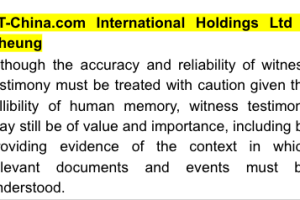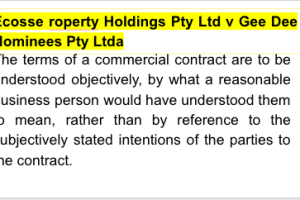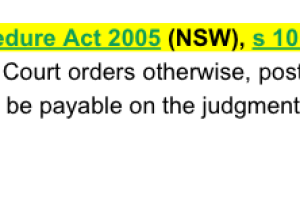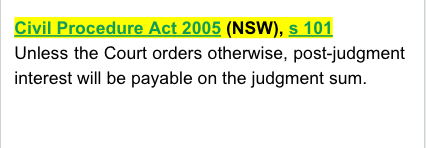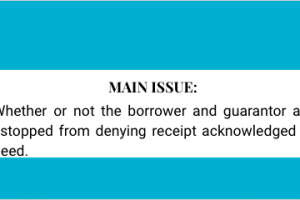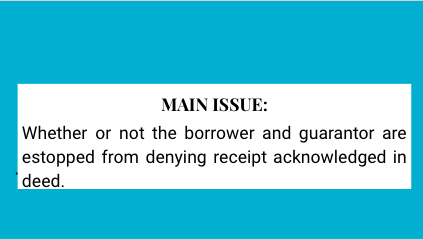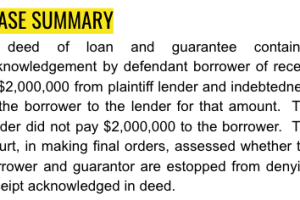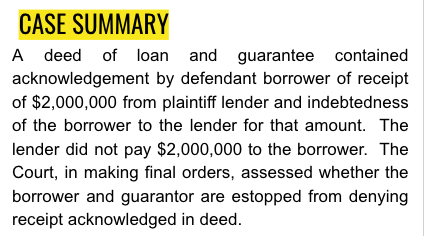Parties Dispute Terms of Deed of Loan and Guarantee

White v Data Transfer Services Pty Ltd & Ors (No 2) [2022] NSWSC 963 (20 July 2022)

A deed of loan and guarantee contained acknowledgement by the defendant borrower of receipt of $2,000,000 from the plaintiff lender and indebtedness of the borrower to the lender for that amount. The lender did not pay $2,000,000 to the borrower. The Court, in making final orders, assessed whether the borrower and guarantor are estopped from denying receipt acknowledged in deed.

Facts:
The plaintiff, Mr. John White, sues the defendants for damages for alleged breaches of their obligations under a Deed of Loan and Guarantee dated 22 August 2014 (the Deed). The first defendant, Data Transfer Services Pty Ltd (ACN 139 443 708) (DTS) is the borrower named in the Deed. The second defendant, Mr. Maher Mina (also known as Mark Mina), is named as the guarantor. Mr. White, DTS, and Mr. Mina executed the Deed in the context of a negotiation for the sale of Mr. White’s mailing services business to Mr. Mina or one of his companies.
The business on the subject of those negotiations was known as JW Mailing Services. It was operated by two companies controlled by Mr. White, JW Mailing Services Pty Ltd and J&S Mailing Services Pty Ltd and it is convenient to refer to it simply as the White Business. Those two companies were to be the vendors in the transaction under negotiation (the Vendors). The negotiations commenced in 2013. By about December 2013, DTS was the company controlled by Mr. Mina that was proposed as the purchaser of the White Business.
The “Commencing Date” is 1 September 2014 and the “Facility Limit” is $2,000,000. Relying on the doctrine of estoppel by deed, the plaintiff contends that clause 2.1, properly construed, precludes DTS from denying that it received a loan of $2,000,000 from Mr. White, and that DTS and Mr. Mina (as borrower and guarantor, respectively) are liable for damages suffered by Mr. White as a result of DTS’s failure to repay the $2,000,000 loan and Mr. Mina’s failure to pay that guaranteed sum on demand.
Whilst Mr. White does not claim to have made a monetary payment to DTS in the sum of $2,000,000 by way of loan, he contends that he made a “notional advance” of $2,000,000 to DTS by procuring a reduction of the price payable to the Vendors for DTS’s purchase of the White Business. The plaintiff claims damages, interest up to judgment in accordance with the Deed, interest after judgment pursuant to s 101 of the Civil Procedure Act 2005 (NSW), costs, and interest on costs.
The defendants deny that clause 2.1 of the Deed gives rise to an estoppel and contend that they are not liable because Mr White did not make any loan of $2,000,000 to DTS, either in the form of a monetary advance or in the form of a reduction in the price payable by DTS for the White Business.

Issue:
Whether or not the borrower and guarantor are estopped from denying receipt acknowledged in deed.

Applicable law:
Civil Procedure Act 2005 (NSW), s 101 - provides that unless the Court orders otherwise, post-judgment interest will be payable on the judgment sum.

Cousens v Grayridge [2000] VSCA 96 - held that the fraudster had implied authority to collect the cheques and it was irrelevant that he had subsequently applied the funds for his own purposes rather than for the benefit of the borrower.
Ecosse Property Holdings Pty Ltd v Gee Dee Nominees Pty Ltd (2017) 261 CLR 544; [2017] HCA 12 - provides that the terms of a commercial contract are to be understood objectively, by what a reasonable businessperson would have understood them to mean, rather than by reference to the subjectively stated intentions of the parties to the contract.

ET-China.com International Holdings Ltd v Cheung (2021) 388 ALR 128; [2021] NSWCA 24 - where although the accuracy and reliability of witness testimony must be treated with caution given the fallibility of human memory, witness testimony may still be of value and importance, including by providing evidence of the context in which relevant documents and events must be understood.

Fox v Percy (2003) 214 CLR 118; [2003] HCA 22 - where the factors referred to by his Honour require primary emphasis to be placed on the objective surrounding facts that are either undisputed or established by contemporaneous documents, and the inherent probabilities and improbabilities.
Greer v Kettle [1938] AC 156 - provides that the doctrine of estoppel by deed is founded on the solemnity of a deed.
Helmich and Taylor v Thorp and Strathdee [1997] 3 NZLR 86 - provides that estoppel by deed is not confined to statements in recitals but applies also, and indeed originally applied only, to statements in operative provisions.
Watson v Foxman (1995) 49 NSWLR 315 - provides that human memory of what was said in a conversation is fallible for a variety of reasons, and ordinarily the degree of fallibility increases with the passage of time, particularly where disputes or litigation intervene, and the processes of memory are overlaid, often subconsciously, by perceptions or self-interest as well as conscious consideration of what should have been said or could have been said.
Analysis:
Clause 2.1 of the Deed of Loan and Guarantee precludes the defendants from denying receipt by DTS of the $2,000,000, precludes DTS from denying its liability as borrower to repay that sum together with interest to Mr. White, and precludes Mr. Mina from denying his liability as guarantor to whom a demand was issued on 4 November 2019. Estoppel by deed operates to preclude the defendants from denying the advance acknowledged in clause 2.1 of the Deed of Loan and Guarantee.
The defendants’ submission that Mr. White “was never going to make any payment” is correct but irrelevant in light of the other features of the present case. Whether the executory obligation, being the obligation for which the parties to a deed have adopted a receipt clause as a convenient fiction, involves a future payment or some other form of future consideration, the party who has acknowledged receipt is estopped from departing from that statement in the deed in the absence of circumstances that would give rise to rectification or rescission of the deed.
Conclusion:
The plaintiff is entitled to judgment against DTS and Mr. Mina in respect of their breaches of their obligations under the Deed of Loan and Guarantee in the sum of $1,800,000 (being the $2,000,000 sum of the “Facility Limit” referred to in clause 2.1, less the payment of $200,000 made in about October 2014 plus interest at the rate of 4 percent per annum calculated monthly from 1 February 2015.
The plaintiff is entitled to judgment against each defendant in respect of that amount, subject to an order precluding the plaintiff from recovering a total sum from the defendants that exceed that amount. Unless the Court orders otherwise, post-judgment interest will be payable on the judgment sum in accordance with s 101 of the Civil Procedure Act.

